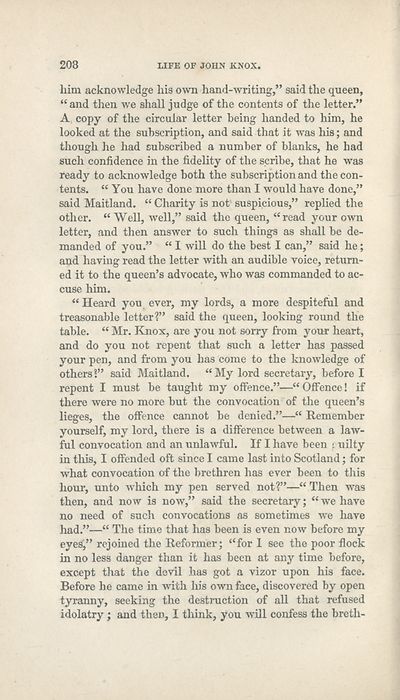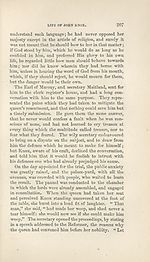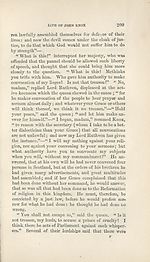Download files
Complete book:
Individual page:
Thumbnail gallery: Grid view | List view

208
LIFE OF JOHN KNOX.
him acknowledge his own hand-writing,” said the queen,
“ and then we shall judge of the contents of the letter.”
A copy of the circular letter being handed to him, he
looked at the subscription, and said that it was his; and
though he had subscribed a number of blanks, he had
such confidence in the fidelity of the scribe, that he was
ready to acknowledge both the subscription and the con¬
tents. “ You have done more than I would have done,”
said Maitland. “ Charity is not suspicious,” replied the
other. “ Well, well,” said the queen, “read your own
letter, and then answer to such things as shall be de¬
manded of you.” “ I will do the best I can,” said he;
and having read the letter with an audible voice, return¬
ed it to the queen’s advocate, who was commanded to ac¬
cuse him.
“ Heard you ever, my lords, a more despiteful and
treasonable letter?” said the queen, looking round the
table. “ Mr. Knox, are you not sorry from your heart,
and do you not repent that such a letter has passed
your pen, and from you has come to the knowledge of
others!” said Maitland. “My lord secretary, before I
repent I must be taught my offence.”—“Offence! if
there were no more but the convocation of the queen’s
lieges, the offence cannot be denied.”—“ Remember
yourself, my lord, there is a difference between a law¬
ful convocation and an unlawful. If I have been f uilty
in this, I offended oft since I came last into Scotland; for
what convocation of the brethren has ever been to this
hour, unto which my pen served not?”—“ Then was
then, and now is now,” said the secretary; “ we have
no need of such convocations as sometimes we have
had.”—“ The time that has been is even now before my
eyes,” rejoined the Reformer; “for 1 see the poor flock
in no less danger than it has been at any time before,
except that the devil has got a vizor upon his face.
Before he came in with his own face, discovered by open
tyranny, seeking the destruction of all that refused
idolatry ; and then, I think, you will confess the breth-
LIFE OF JOHN KNOX.
him acknowledge his own hand-writing,” said the queen,
“ and then we shall judge of the contents of the letter.”
A copy of the circular letter being handed to him, he
looked at the subscription, and said that it was his; and
though he had subscribed a number of blanks, he had
such confidence in the fidelity of the scribe, that he was
ready to acknowledge both the subscription and the con¬
tents. “ You have done more than I would have done,”
said Maitland. “ Charity is not suspicious,” replied the
other. “ Well, well,” said the queen, “read your own
letter, and then answer to such things as shall be de¬
manded of you.” “ I will do the best I can,” said he;
and having read the letter with an audible voice, return¬
ed it to the queen’s advocate, who was commanded to ac¬
cuse him.
“ Heard you ever, my lords, a more despiteful and
treasonable letter?” said the queen, looking round the
table. “ Mr. Knox, are you not sorry from your heart,
and do you not repent that such a letter has passed
your pen, and from you has come to the knowledge of
others!” said Maitland. “My lord secretary, before I
repent I must be taught my offence.”—“Offence! if
there were no more but the convocation of the queen’s
lieges, the offence cannot be denied.”—“ Remember
yourself, my lord, there is a difference between a law¬
ful convocation and an unlawful. If I have been f uilty
in this, I offended oft since I came last into Scotland; for
what convocation of the brethren has ever been to this
hour, unto which my pen served not?”—“ Then was
then, and now is now,” said the secretary; “ we have
no need of such convocations as sometimes we have
had.”—“ The time that has been is even now before my
eyes,” rejoined the Reformer; “for 1 see the poor flock
in no less danger than it has been at any time before,
except that the devil has got a vizor upon his face.
Before he came in with his own face, discovered by open
tyranny, seeking the destruction of all that refused
idolatry ; and then, I think, you will confess the breth-
Set display mode to:
![]() Universal Viewer |
Universal Viewer | ![]() Mirador |
Large image | Transcription
Mirador |
Large image | Transcription
| Antiquarian books of Scotland > Scotland/Scots > Life of John Knox ; and, The life of Alexander Henderson > (226) |
|---|
| Permanent URL | https://digital.nls.uk/131835016 |
|---|
| Description | Thousands of printed books from the Antiquarian Books of Scotland collection which dates from 1641 to the 1980s. The collection consists of 14,800 books which were published in Scotland or have a Scottish connection, e.g. through the author, printer or owner. Subjects covered include sport, education, diseases, adventure, occupations, Jacobites, politics and religion. Among the 29 languages represented are English, Gaelic, Italian, French, Russian and Swedish. |
|---|

